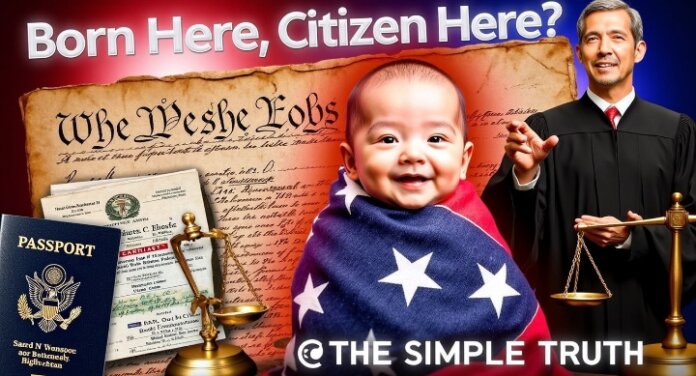Imagine a baby’s first cry echoing in a Miami hospital. The parents might have just arrived or lived here for generations. But that sound makes the baby something special: an American citizen. Right then. Right there. That’s birthright citizenship. It’s a big part of what makes America unique, written right into our rulebook – the Constitution. But what exactly is it? And why do people sometimes argue about it, even taking the fight to the Supreme Court? Let’s break it down, step by simple step.
What is Birthright Citizenship? Citizenship from Day One
Birthright citizenship means you become a citizen of a country automatically because you were born inside its borders. For the United States, this isn’t just a tradition – it’s law. It comes from the 14th Amendment to the U.S. Constitution, added way back in 1868.
Here’s the key line from the 14th Amendment:
“All persons born or naturalized in the United States, and subject to the jurisdiction thereof, are citizens of the United States and of the State wherein they reside.”
What does that mean in plain English?
- Born in the USA: If you enter the world on U.S. soil (like a state, territory, or even certain U.S. ships or planes).
- Subject to U.S. Rules: This mainly excludes kids born to foreign diplomats or enemy soldiers during a war. For nearly everyone else born here – including children of immigrants, even those without legal papers – courts say they are under U.S. authority.
- Instant Citizenship: Boom! You’re a U.S. citizen. That’s birthright citizenship USA or birthright citizenship US in action. It’s the most common way people become citizens. The other main path is naturalization, a process immigrants go through later.
Think of it like this: Being born on American soil plants a flag on you that says “U.S. Citizen.” It’s automatic.
Why Do We Have the 14th Amendment? Fixing a Terrible Wrong
The 14th Amendment wasn’t just about citizenship. It was added after the Civil War to fix a huge injustice. Before it, the Supreme Court had made a horrible ruling called Dred Scott v. Sandford (1857). It said Black people, whether enslaved or free, could never be U.S. citizens.
The 14th Amendment smashed that ruling. Birthright citizenship was key to guaranteeing citizenship and equal rights to formerly enslaved people and their children. It was about fairness and belonging.
Has Birthright Citizenship Been Tested? The Supreme Court Steps In
Yes! While the core idea is strong, birthright citizenship has faced challenges. Debates sometimes get loud enough that people wonder: Will the Supreme Court rule on birthright citizenship?
- The Big Case: United States v. Wong Kim Ark (1898)
This is the Supreme Court case name that settled it. Wong Kim Ark was born in San Francisco to Chinese parents who were not U.S. citizens. When he returned from a trip abroad, officials tried to block him, saying he wasn’t a citizen. The Supreme Court ruling was clear: Because he was born here, he was a citizen under the 14th Amendment. This SCOTUS decision is the rock-solid foundation for birthright citizenship today. People searching “birthright citizenship supreme court” or “us supreme court birthright citizenship” are often looking back at this landmark case.- The Trump Challenge: Talk of Change
More recently, former President Donald Trump made headlines. He often said he wanted to stop birthright citizenship for children of undocumented immigrants, maybe even by a presidential order. His advisor Pam Bondi supported this idea. This sparked huge debate and searches like “Trump birthright citizenship” and “Supreme court birthright citizenship decision?”. However, almost all legal experts, from different political views, said a president cannot change this alone. They argued only a new Constitutional amendment could alter the 14th Amendment‘s guarantee. No major Trump v Casa case directly challenging birthright citizenship made it to the Supreme Court (SCOTUS) during his time. If it had, the supreme court justices, including newer members like Ketanji Brown Jackson (Justice Jackson) and Amy Coney Barrett, would have been central figures. - Other Cases & Today’s Court
Cases like Louisiana v. Callais (or Louisiana v Callais) might involve citizenship tangentially, but they haven’t touched the core birthright citizenship principle. People often check “supreme court rulings today,” “SCOTUS rulings today,” or “what did the Supreme Court rule on today” hoping for news, but a major supreme court decision on birthright citizenship hasn’t happened recently. The supreme court decision in Wong Kim Ark still stands tall.
Is the U.S. the Only Country? Birthright Citizenship Around the World
Birthright citizenship makes America special, but we’re not alone. If you search “what countries have birthright citizenship” or “birthright citizenship countries,” you’ll find about 30-35 countries practice it purely based on the location of birth (called jus soli, Latin for “right of the soil”). Our neighbors Canada and Mexico are on the list. However, most countries, including those in Europe and Asia, use jus sanguinis (right of blood). This means citizenship comes from your parents’ nationality. The UK (birthright citizenship UK) changed its rules in 1983, making it much harder to get citizenship just by being born there.
The Supreme Court’s Power & Legal Roadblocks (Injunctions)
The US Supreme Court (SCOTUS) is the final boss for U.S. law. People watch closely for “supreme court decisions today,” “Scotus decisions,” and “supreme court opinions,” especially on big issues like citizenship.
Sometimes, when people sue to stop a government action, lower courts issue orders called injunctions. A nationwide injunction (or universal injunction) stops that action everywhere in the country. Recently, the Supreme Court has questioned whether lower courts should issue such broad nationwide injunctions. They seem to prefer smaller, more focused rulings. This matters for birthright citizenship because if a future president did try to change it by executive action, lawsuits would fly. Those lawsuits would likely ask for injunctions to block the change immediately. The Supreme Court rulings on how and when injunctions can be used could become very important in that fight.
Your Questions Answered: Birthright Citizenship Basics
- H3: Do babies born in the US automatically get citizenship?
Yes! This is the whole point of birthright citizenship. If a baby is born on U.S. soil and under U.S. authority, they are a U.S. citizen instantly. (Search terms: Do babies born in the US automatically get citizenship?, Does giving birth in the USA give citizenship?) - What’s the difference between a birthright citizen and a naturalized citizen?
- Birthright Citizen: Got citizenship automatically at birth (usually by being born here, or sometimes through U.S. citizen parents).
- Naturalized Citizen: Was born in another country and went through the legal process (naturalization) to become a U.S. citizen later. Both are 100% equal U.S. citizens!
- How long has birthright citizenship been the law?
Since the 14th Amendment became part of the Constitution in 1868 – over 150 years ago! The Supreme Court strongly backed it up in the Wong Kim Ark case in 1898. - Is birthright citizenship actually in the Constitution?
Yes. It’s written plainly in the very first sentence of the 14th Amendment. (Search term: Is birthright citizenship in the constitution?)
Why Does Birthright Citizenship Still Matter?
Birthright citizenship is woven into America’s identity. It reflects the powerful idea that anyone born here belongs here and gets the full rights of citizenship, no matter who their parents are or where they came from. It offers stability and a clear path to belonging for millions.
Of course, debates continue, often tied to immigration. Some people argue it encourages people to come to the U.S. without permission to have babies (though research suggests this isn’t a major reason most people migrate). Others see it as a core American value of equality, rooted in the 14th Amendment‘s promise after the Civil War.
If a serious challenge ever arises, it would likely mean huge legal battles, possible nationwide injunctions, and ultimately, a showdown at the Supreme Court. Everyone would watch SCOTUS for a supreme court ruling on birthright citizenship.
The Bottom Line: Right now, birthright citizenship remains a fundamental right protected by the U.S. Constitution and upheld by history and the Supreme Court. It’s a defining feature of what it means to be American – a nation where being born within its borders opens the door to citizenship.
What do you think about birthright citizenship? Is it a vital part of who we are as Americans, or do you believe it needs updating? Share your thoughts respectfully in the comments below – let’s talk!



